Of all of Goichi Suda’s games, Lollipop Chainsaw has to have been the one with the strongest marketing push behind it, with Warner Bros. rolling out a surprising amount of promotionalfirepower to convey the supposedly defining characteristics of the title: Off-the-wall humour and a high school cheerleader ferociously decapitating her way through zombie hordes. If you played it however, you may have found the game is defined as much by the fact that it’s built like an old-school B-tier action experience than it is by any of the marketing bullet points mentioned above. That B-tier flavour is present in the camera which frequently fails to focus on your targets of attack, in the moments where paths through levels are just a little too conveniently opened up or closed off, and in the forward offer of concept art and OST tracks in exchange for rare in-game currency. The weirdness of Lollipop Chainsaw is meant to be in its spontaneous, random jokes, and deliberate clash of horror movie plotline with impossibly upbeat protagonist, but we’ve seen enough similar media in 21st century “nerd culture” that that’s comparatively mundane. The true surrealism of Lollipop Chainsaw is that it looks like a game that a Playstation 2 dev somehow sent into the future.
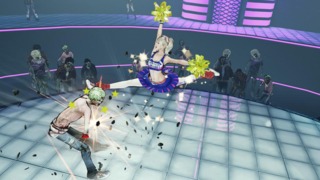
There’s something not necessarily fun, but oddly nostalgic about seeing an anachronistic character action game like this one that came out in 2012. However, it just doesn’t pass the bar as a modern entertainment experience. One reason for this is that Lollipop Chainsaw doesn’t hold together as a hack-and-slash game: The heavy attacks often feel needlessly drawn-out, but the light attacks are only meant to stun enemies, so your choice is often between moves that feel sluggish or moves that feel ineffectual. You can buy more moves using the in-game currency, but most of these replicate functions of existing ones, and the game essentially makes you purchase your way towards a half-interesting combat system. Lollipop Chainsaw also throws in all sorts of features to encourage you to replay the game, but then splices these novelty minigames into its levels that don’t feel like they’re meant to be played more than once, and sometimes don’t even stand up to that. Beyond the gameplay, this title also has that classic game narrative problem of dialogue beats and cutscenes usually only serving to contextualise gameplay instead of creating any depth or development for the characters.
It’s tempting to say these kinds of traits are to be expected from a B-tier game and that we shouldn’t discount Lollipop Chainsaw as an entertaining or interesting experience because of them. The appeal of B-tier titles has traditionally been that while they may have a lot of rough edges and less polish than a AAA game, they can reach stylistic heights and niches that AAA cannot. However, there are three problems with this idea as you can apply it to Lollipop Chainsaw: 1. The stylistic elements of the game and the other parts that make it up are largely inseparable (the same goes for any video game), 2. Lollipop Chainsaw’s stylistic elements are as bad if not worse than its technical elements, and 3. The above description of AAA/B-tier dichotomy no longer applies for the industry, especially within the genres that Lollipop Chainsaw touches on. Let’s tackle these problems in order.
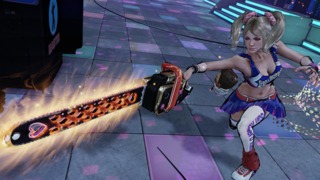
Here’s a big one to start on: Lollipop Chainsaw’s chainsaw does not suit Lollipop Chainsaw. I get it, there’s meant to be a contrast between Juliet Starling’s good girl attitude and her loud, gory weapon. Juliet’s whole deal is that she is an innocent and optimistic character in an occupation that would normally be considered messy and brutal. All good stuff, but that doesn’t change that this is a game where at least 95% of playtime is gameplay, so it needs to use its character handling and the choices you make with characters to convey a sense of who they are, and Juliet does not feel like a chainsaw. Our cheerleader protagonist is squeaky clean, acrobatic, and peppy, but her weapon feels dirty, forceful, and lethargic. You also cannot do with the chainsaw what you’d want to do with a chainsaw: Get a sense of cutting through enemies as opposed to just making contact with them. Compare the way this game uses a chainsaw to how Gears of War uses the same. In Gears the weapon becomes temporarily lodged in an enemy and rips right through them with a tactile sensation. Gears can afford a longer chainsaw attack than Lollipop can due to melee attacks being rarer in Gears, but that’s far from the only factor. Weirdly, Lollipop has moments which do accurately emulate cutting through things, but it’s mostly with inanimate objects instead of enemies.
Speaking of enemies, Grasshopper manages to largely miss the point of having zombies in your action game. One of the motivations for doing so is that you can throw a lot of enemies at the player that can easily be killed, but it’s not like Lollipop Chainsaw uses that many more enemies than other hack-and-slashes and it’s not like they’re just falling apart around you either. Enemies can take a beating and most moves in the game are built around handling them one at a time, leaving you famished for some means of crowd control. One reason you particularly yearn for effective moves is that unless you save all of San Romero High’s students from attacking zombies you get the “bad” post-credits scene. Getting the “good” final cutscene essentially means playing escort quest for 21 different NPCs that are rooted to the spot, and if even one of them dies you might have to start your level over.
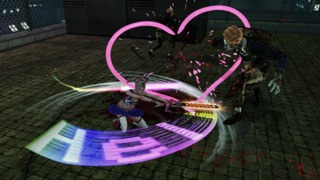
There is an expensive upgrade that lets you pull off what is essentially Link’s Spin Attack, and that helps a lot, but I played through most of the game before I discovered it. Move descriptions are just vague, short sentences with no screenshots, animations, or indications of the combos involved, so good luck finding useful ones. Of course once I got that spin attack, the whole combat remoulded to be about executing it as many times as possible. It would have been more ruinous for the game, but the combat enters a slow-motion mode and awards you special currency every time you clear out multiple zombies at once. It’s a nice touch that keeps you enthused about doing it.
Really, the zombies themselves are a creative tragedy. I know we don’t need any more essays on zombie fatigue in the world, but keep in mind this isn’t just another zombie adventure, this is a zombie adventure from one of the most recognised creative personalities in video games. If you told anyone from another media field that one of the most prominent auteurs in this industry was asked to come up with a fresh new idea for a world and premise, and it amounted to “undead apocalypse” they’d think you were joking. It might seem like Lollipop Chainsaw has a twist on the typical zombie format, but its dedication to subversion is threadbare.
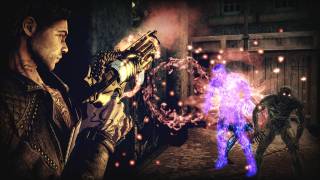
We can compare this game to Grasshopper’s 2011 title Shadows of the Damned, a third-person shooter which had you journeying into hell to rescue your girlfriend. That is a very generic video game premise, but Grasshopper made the concept work by outfitting hell with gothic European architecture, bones as ammunition, strawberries keys, and plenty more finely-spun dream logic. However, when they think about their world and setting for Lollipop Chainsaw they go for a burned-out high school, an empty stadium, or a farm, tip a big bucket of stock zombies into it, and call it a day. The creators aren’t trying to dodge tropes here, they’re purposefully hoarding them, and the experience ends up delivering much more chainsaw than it does lollipop.
In an early exposition dump the game shows you a map of its multiverse, with our world accompanied by a zombie dimension and a heaven dimension, which you’d naturally think the plot is building towards, but it never mentions them again, let alone allows you to visit these more exotic locations. It’s also a shame that levels are so long because it means there are large gaps between changes of setting and you have to spend a lot of time in a play session before you feel like you reach a natural stopping point. You do get to visit an arcade in the fourth stage, which breaks up things somewhat, but this is by far the most minigame-heavy portion of the experience and recycling Pacman still isn’t very culturally ambitious for a video game. Although to its credit, this stage also features fairly elaborate homages to seldom-referenced early 80s games like Taito’s Elevator Action and Nichibutsu’s Crazy Climber.
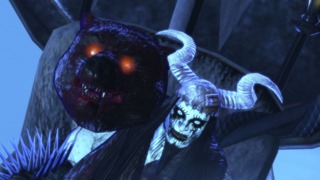
The best things about Lollipop’s world are the bosses, who each continue the high school drama theme by representing a different clique like punk, hippie, or rockabilly. I wish these weren’t the bad guys because it makes it feel like anyone with a more interesting character design than Juliet or her immediate family has to be removed from the game as soon as they appear. Lollipop could actually get more out of its concept if it themed the levels around these different antagonists, partly because it has a very loosely defined sense of who the bad guys are (they’re almost never met until you are right at the end of a level), but primarily because the high school theme is clearly the most original ingredient in the game, yet it’s simultaneously the one that gets the least love.
Of course, you could argue that the twist of Lollipop Chainsaw doesn’t have to be in its thematics because it’s in its jokes. I’d still argue that fun, silly zombie media is a well-wornidea at this point, but I also don’t think Lollipop Chainsaw is a competent comedy. I was genuinely surprised to find that in 2010 Suda51 bragged about “extreme twists” in the game and how it had people bent over with laughter. Apart from a moment at the start and a moment at the end, I’m not sure where these twists are meant to be, and I genuinely didn’t think the game was meant to be a comedy on my first playthrough. You can see where there’s light-heartedness and humour in the game, but it’s not like Lollipop Chainsaw is particularly committed to it and the script almost cannot conceive of a joke that isn’t the shortest possible road to talking about bodily functions, sex, or pop culture.
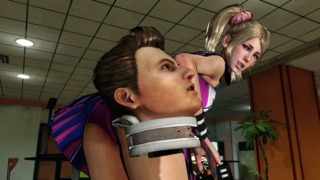
There are some jokes that work because the unpredictable timing of a video game means they randomly happen to land at the right moment and there are genuinely funny conversations where Juliet’s boyfriend Nick is flatly accepting her nonsense statements (voice acting goes a long way here). However, most of it is rescuing a student and them telling you they shit themselves (the game considers this joke enough of a sidesplitter to use more than once) or an overweight man’s entrance being accompanied by a comedic “fat guy noise”, and comparatively this is the tasteful stuff. A joke used more than once is about a priest who attempted to drug and sexually assault Nick. Juliet doesn’t fair better at escaping this kind of sexual debasement either.
Look, we know what this game is selling: The player character is a cheerleader on her eighteenth birthday dressed with a short skirt and plenty of Bare Midriff™. It’s promising to see a woman be made the sole protagonist of an action game, but you also have to ask why she’s given that podium and how the game handles that opportunity. Juliet is a character who is undoubtedly empowered by her fighting abilities, but while we often tend to talk about a character’s empowerment or disempowerment falling somewhere along a single sliding scale, things get more complicated when we talk about women who can defend themselves ably but are also sexualised. We might want to call Juliet and other characters who are both sexualised and empowered “sexually empowered”, but that’s rarely accurate. Let’s look for a moment at a character who is obviously sexually empowered in some regards: Platinum Games’ Bayonetta. Bayonetta’s methods of attack are expressive of her sexuality and vice-versa. When she removes her clothes it’s to summon powerful beasts to destroy her foes, her finisher attacks are themed around dominance, and she owns her sexuality. Never is her sexuality manipulated by other characters or used as a means to hurt her, instead it gives her power and influence. However, Juliet’s menu of attacks is coincidental to her sexuality. This is highly typical in video games, and is not indicative in itself of sexual disempowerment, but it’s still important to understand the gulf between these two concepts.
As for where Juliet and similar characters are disempowered, let’s start by noticing that it’s never implied that Juliet or many provocatively dressed women in video games are dressed that way because they enjoy it, or because it particularly ties into their personality. Bayonetta dresses how she does because it makes her feel good, reflects her BDSM interests, and even gives her her powers, but the answer for why a character like Juliet dresses the way they do is “That’s just their uniform”. It’s just an aspect of their design that no one speaks about. It ignores basic principles of good character design and the subtext here is that characters like Juliet aren’t dressed they way they are for their benefit or because it recognises an element of their personhood, instead it’s purely for the benefit of the audience and sometimes other characters. Interestingly, James Gunn (who consulted on Lollipop Chainsaw) said that the game objectifies Nick the same way most games objectify women, by having him just be a head hanging from Juliet’s waist. According to Gunn, Nick is emasculated and the situation presents a reversal of traditional gender roles. However, for most of the game Nick seems to be surprisingly comfortable in his situation and is not sexually objectified, meanwhile Juliet is made into eye candy and acts as a living vessel for “high school girl” tropes. It suggests a very loose understanding of objectification and traditional gender roles.
It’s been said many times before, but always bears repeating: There’s nothing inherently wrong with a sexualised woman in a video game or a woman character who is not sexually empowered. However, when this becomes a norm for female characters in games we hit on a crop of worrying issues, including limiting the medium’s variation in its characters and contributing to the idea of women as sexual consumables. Lollipop Chainsaw is not only guilty of this, it also uses its base level objectification as a stepping stone on a more troublesome path. In fact, Lollipop Chainsaw goes to bizarre lengths to present a main character who doesn’t care all that much about sex, but is none the less framed in a sexual manner.
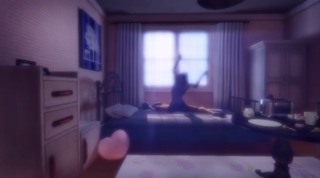
Both Bayonetta and Juliet pole dance, but while Bayonetta does it for self-satisfaction, Lollipop Chainsaw wants to make sure you know Juliet sees no sexual overtones in the performance and just does it for the exercise. You are meant to find something sexual in the act even when that’s not what Juliet wants. Similarly, the player is welcomed into Juliet’s bedroom as the camera lustfully crawls up her body, but the player is also told that she doesn’t want any “funny business” and that she’s loyal to her boyfriend. It’s a scene that’s sexualised despite Juliet’s wish to desexualise it. Then it gets more aggressive. Characters in the game cat call Juliet or otherwise use her sexuality and gender as an insult or even a threat. A teacher calls her a “bitch”, a student comments on her breasts, a zombie tells her they should take a shower together, a different zombie tells her they’re going to have violent anal sex, and on the pattern goes.
You could say that Lollipop Chainsaw is being feminist because it lets a woman fight back against her verbal harassers, but again, the violence is coincidental to the sexual elements. Never is it flagged that Juliet’s kills are revenge for the comments zombies make and these statements are made by allies and enemies alike. It’s also rarely depicted that this language might have a negative impact on Juliet, and by failing to depict an emotional response here the developers treat her with the same level of dehumanisation that these characters do. The first boss fight gets a little closer to acknowledging this kind of language as emotionally damaging; the boss is capable of projecting giant letters at Juliet calling her names like “slut” and “whore”. If they collide with Juliet she takes a hit to her health, which shows some sympathy to her situation, but at the same time this scene turns these sexual insults into a form of spectacle and still shows a creepy reluctance of the game to understand any kind of harassment that isn’t about overt physical violence. Then there’s the less verbal harassment directed at Juliet.
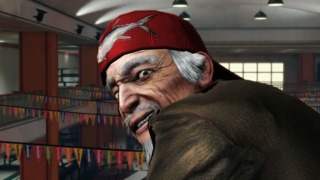
A recurring joke in the game is that Juliet is oblivious that her sensei was sexually harassing her while she was underage and the sensei himself is played as a kooky, lovable old man for being enthused about this harassment. About four times in the first hour of the game it’s stated that Juliet is uncomfortable with people looking up her skirt, but it’s obviously only talked about so much to make it enticing and the game rewards you with an achievement if you do it. Lollipop Chainsaw consistently frames the violation of an eighteen year old girl’s sexual boundaries as a good thing. Every time Juliet is sexually harassed it’s meant to be funny or titillating or throwaway fodder to encourage zombie killing without considering the weight of the topic. Juliet is a sexually idealised character and part of that idealisation is that you can insult her and cross her boundaries and there are no consequences.
This is the difference between empowerment and disempowerment. While Juliet’s combat training gives her power over others, her unchallenged harassment is about her being used for the amusement of other people with no say in the matter. One is a weapon she wields against other people, the other is a weapon that is wielded against her. It would be easy to say that one cancels out the other or that her status of empowerment is a 50/50 split, but when the games industry almost always manages to make sure male protagonists are physically empowered and don’t suffer sexual disempowerment, why should anything close to what Lollipop Chainsaw is doing get a free pass? It’s not only painfully shoddy character work, the game’s light-hearted use of harassment has the power to project beyond the fourth wall and potentially alienate and hurt both women players and players who have been victims of sexual harassment. And by revelling in harassment and sexism the game also trivialises these issues and encourages its audience to dismiss them as actual problems.
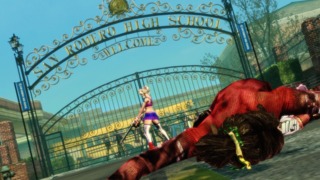
To bring this back round, the grand trick of Lollipop Chainsaw is making you expect a trade-off where there is none. The face of the game is an energetic and subversive experience from one of the top creative minds of the medium, and you might think wading through its uninspired writing, grubbier areas of design, or misguided use of sexuality is the price you have to pay to get to what that face promises. In reality however, it’s all smoke and mirrors and there is nothing to wade your way to. The illusion the game benefits from is delivered as much by its marketing as it is its opening moments. If you’ve seen Lollipop Chainsaw’s advertisingmaterials, you may have seen that it shows so much better in them than in its final form. It’s because those adverts are edited with enough precision to never let you get a single, long look at the game.
The fights look passable when taken from camera angles you will never see in the combat and when containing a variation of moves that Lollipop Chainsaw does not encourage you to perform. The trailers are kitted out with moments which are great for showing off Juliet as a character, but these moments make up a miniscule percentage of the actual experience. The trailers use jokes and scenes ripped from the game, but the sharp editing, audio, and presentation of these trailers belies the clumsy way they’re rolled out in the real product. Lollipop Chainsaw feels built purely to be marketed well, even if I don’t think for a second that was how it came together. The meta-media makes you believe this is something James Gunn actually worked on, but the game itself does not have respect either for its audience (especially if they’re women or sexual harassment victims), nor its main character.
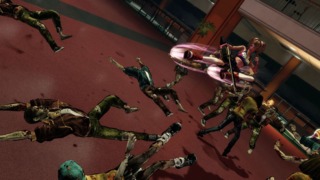
When I’ve lamented the disappearance of B-tier games in the recent past, people have often responded by saying that the hole they left behind has been filled by the modern independent games scene. There’s more than a few grains of truth in that statement, but I think it ignores the specific style of experience that many older B-tier titles have resembled. A lot of these games were essentially adopting the structure and approaches of then current AAA games, but trying to play with gameplay or audio-visual concepts in more creative ways than many mainstream titles were. As time has gone on however, I think we’ve seen the indie scene and even some AAA developers produce subversive takes on the big name genres on a wider scale. “We’re doing something slightly different in the genre” is no longer an excuse you can hang your game on; you have to react to the creative environment. If you want to make an alternative fighting game today you’re battling against the likes of Skullgirls and Killer Instinct. If you want to make an alternative shooter today you have to outclass games like Nexuiz and the new Unreal Tournament. If you want to create an alternative RPG today then you have to be conscious that games like Dark Souls and Undertale are part of the scene.
It’s not that these genres couldn’t do with more originality in them or even that it’s impossible to surpass these games in terms of quality, but today’s games industry may be more ferocious and competitive than ever, and Lollipop Chainsaw is a good example of what happens when you don’t react to the creative environment. While this kind of game might have flown 10 years ago, today there other games out there pursuing the same goals Lollipop Chainsaw does and doing a far better job of it. If you want an imaginative action game full of silly spectacle why not try Saints Row 3 or 4? They have more character, more unique style, and fewer frustrating moments than Lollipop Chainsaw. Still want your game to be a hack-and-slash? 2013’s Devil May Cry goes fluid and varied with its combat system everywhere Lollipop goes clunky and repetitive. What’s more, its otherworld of floating islands and remixed geometry represents far better art design than anything in Lollipop Chainsaw. Want a mix of smartly-crafted action gameplay and ridiculous spectacle? Check out what Platinum Games have been making. In fact, Bayonetta does most of the things Lollipop Chainsaw is trying to do and comes out on top in every category. It’s another fantastical hack-and-slash game obsessed with its sexualised protagonist, but with gameplay that you actually do want to keep coming back to, blockbuster moments that are orders of magnitude more bold and original than anything Lollipop does, and a protagonist that the game respects more. The bottom line is you don’t have to put up with what games like Lollipop Chainsaw are trying to peddle, you can do better. Thanks for reading.
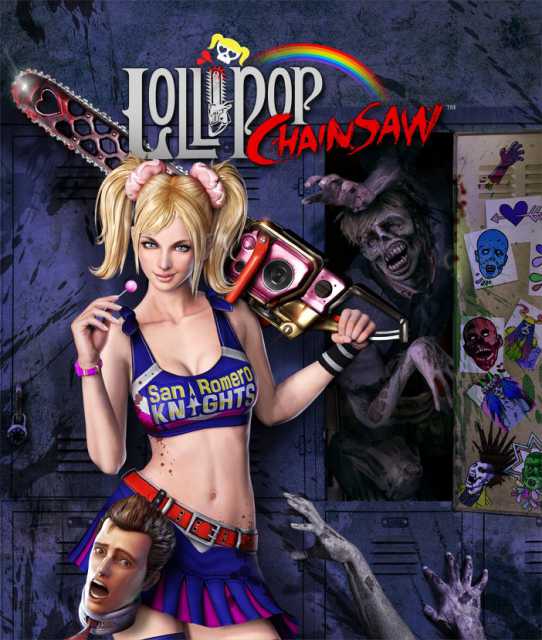
Log in to comment